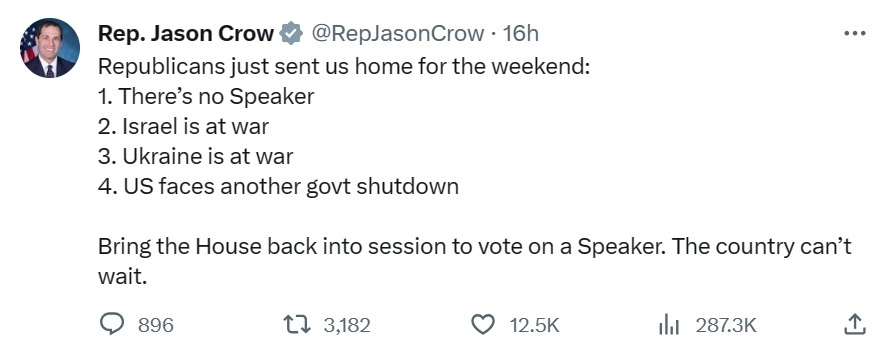As Americans watch the military and humanitarian crisis unfold in Israel, the US Congress is still unable to act as it lacks a Speaker of the House. Unfortunately for Ukraine, the leading candidate Republican for Speaker, as of now, is a strong opponent of aid for Ukraine.
The Speaker of the House, the most powerful person in the US Congress, wields incredible decision-making authority. Aside from choosing committee assignments for Members, the Speaker also decides what bills are allowed to be brought to the floor for a vote.
JOIN US ON TELEGRAM
Follow our coverage of the war on the @Kyivpost_official.
Without a Speaker no action on today's top matters, such as US assistance for Ukraine and Israel, can be taken. Other key issues, such as passing an annual budget, which would avoid a shutdown of the US Federal Government, remain in limbo as its Nov. 17 deadline nears.
Last week, Congressman Steve Scalise looked likely to be the next Speaker. Scalise, who walks with a limp following a crazed Democrat shooting him during a congressional baseball game, has voted in favor of Ukraine on every House vote he has participated in. However, his nomination failed due to in-fighting among Republicans.
The new Republican Speaker-nominee, Jim Jordan, is a hardline Trump supporter who received the former President's endorsement. Jordan is said to have a personally favorable view towards assisting Ukraine, however he has routinely voted against assisting Ukraine.
"Jim Jordan has been a consistent 'no' vote on Ukraine," says Steve Moore, a Republican political consultant who formerly worked in Republican congressional leadership, continuing that Jordan "has said that if he were Speaker, he would not bring a vote for aid to Ukraine to the floor of the House of Representatives."

US Urges Backing of ‘Simple’ UN Resolution as Trump Calls for Putin-Zelensky Talks
Jordan is also part of the block that opposes President Biden's legislative strategy of tying, now controversial, Ukraine funding to more popular bills, such as aid for Israel or for domestic emergency services. In this scenario, the bills, though unrelated in content, are not considered separately by Congress, but are conjoined. Thus, forcing a congressman who wishes to vote against Ukraine, to also vote against a different matter of legislation that is politically popular.
Biden's strategy is based on the idea that Republicans would have a hard time justifying to their constituents why they voted against a popular initiative, such as for Israel or for emergency services, thus forcing Republicans to swallow the bitter pill of voting for Ukraine, while getting the kudos for supporting the conjoined, more politically popular legislation.
Jordan, due to his hard-right views, would be unlikely to attract much, if any, support among Democrats, and may well lack enough votes on the Republican side to gain the Speakership.
Though Jordan would likely be unwilling to bring Ukraine aid to a vote, all hope is not lost, says Moore, as "Jordan is a rational negotiator and he may use Ukraine aid to get concessions from the Democrats for border security and/or Israel."
Many conservatives, including outspoken critics of Ukraine aid in DC, such as the Heritage Foundation, have called on Biden to bring Ukraine funding before a Congressional vote as a stand-alone bill, thus forcing Ukraine's backers to justify the bill's expenditures. The White House has avoided this as it is not certain if such a bill would pass Congress due to Republican opposition.
During the previous Speaker, Kevin McCarthy's, era Ukraine-supporting Republicans could always count on strong Democrat support for Ukraine legislation, however that alliance is now broken.
The Democrats in Congress, all of them, voted against Republican Speaker McCarthy when hardline Republicans sought to unseat him for supporting Ukraine. This means no future Republican Speaker can count on Democrats’ support if he faces a challenge from Republicans for supporting Ukraine. Now a Republican who supports Ukraine knows that when push-comes-to shove, he has no allies across the aisle.
The Democrats abandonment of McCarthy, for backing Ukraine legislation supported by the democratic White House, has changed the dynamics in Congress and has contributed to a new calculus of how a Speaker of the House will behave, including whether the new Speaker would even allow votes on Ukraine.
The US House of Representatives, which in September reached a near-record low approval rating of 17%, according to Gallup Polls, remained in disarray when it recessed on Friday, Oct. 13.
That day, Jason Crow, a Democratic Member of Congress summarized the situation in the House in a Tweet, saying, "Republicans just sent us home for the weekend: 1. There is no Speaker 2. Israel is at War 3. Ukraine is at war. 4. US faces another govt shutdown. Bring the House back into session to vote on a Speaker. The country can't wait."
You can also highlight the text and press Ctrl + Enter












